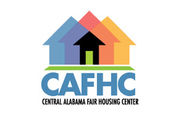In 2018, the Fair Housing Act – a law which protects people from discrimination when they are renting or buying a home, getting a mortgage, seeking housing assistance, or engaging in other housing-related activities – celebrated its 50th anniversary.
When first established in 1968, the historic legislation marked the nation’s commitment to equal opportunities for all. And while significant progress has been made since the law’s enactment, there’s more work to be done. As a nation, we are continually improving our commitment to fair housing; and we at the Central Alabama Fair Housing Center are dedicated to doing our part as well. Following, we take a look at what we can expect for fair housing in 2020 and beyond.
Local Fair Housing Outlook
The Fair Housing Act is an important civil rights legislation that was signed into law to ensure everyone had the opportunity to live where they choose regardless of race, color, national origin, gender, religion, family status or disability. It is important to keep up to date on what’s happening in your individual community. Regrettably, housing discrimination continues to have a devestating impact on marginalized communities.
In order to counteract housing discrimination in your community, redouble your efforts to understand the fair housing law and reflect on how your actions can impact and contribute to segregated communities. Local fair housing organizations like CAFHC are great resources for current fair housing information, training classes, and materials. Browse the countless resources on our website, here.
Our Individual Duty
As a nation, our livelihoods largely depend on free and open markets that embrace equal housing opportunities. And, believe it or not, discrimination that denies opportunity to one or more demographic groups impedes free markets, leading to negative effects on all aspects of a community, including local school systems, economic opportunities, and health. Because of this, it is imperative that individuals in 2020 make a personal commitment to raising awareness and discussing these issues.
So, what actions can you take individually to be a catalyst for positive change in fair housing? Following are some ideas.
- If you see discrimination, challenge it and report it to your local authorities or the S. Department of Housing and Urban Development. Those in the Central Alabama area can use the legal resources on the CAFHC website to contact the appropriate entities.
- Ask yourself, “Which fair housing issues are currently or potentially impacting my life, livelihood, neighbors, and community?”
- Engage in community dialogue about the issues tied to housing choices, including schools, healthy communities, residential displacement, and economic opportunity.
Everyone can play a role in ensuring the future and fair housing for all. It will be more important than ever in 2020 to take a stand against discrimination so that it doesn’t continue for generations to come. To learn more about the future of fair housing and how you can assist us in combating housing discrimination, visit the CAFHC website.

